2018/2/15 at Colorkrew office
To Us, It’s Obvious! Company Growth is ∞ (Unlimited) without Management
- Part 1 "First, let’s introduce each other’s companies”
- Part 2 “Skills necessary for the future”
- Part 3 "Super Flat organization a.k.a. Super Muscular athlete!?”
- Part 4 "Going along with capitalism VS Breaking free from capitalism”
- Part 5 "What is the decisive difference between Colorkrew and Sonic Garden?”
-
Yoshihito Kuranuki
Representative Director of SonicGarden Inc.
After gaining experience as a programmer and manager at a major SI firm, he undertook a venture MBO in 2011 and founded SonicGarden Inc. He created a new business model within entrusted software development, offering monthly fixed rates and performance-based contracts - “Entrusted Development Without Delivery.”
As a company director, he enacted various progressive initiatives, including remote work for all employees, the abolition of the head office, and company administration without management.
His authored works include “Succeed by Losing ‘Delivery,’” and “Succeed with a Remote Team.” His motto is, “A programmer at heart, a director by trade.” See his blog at:http://kuranuki.sonicgarden.jp/ -
Keiji Nakamura
CEO/Managing Director of Colorkrew
After entering Toyota Tsusho Corporation, transferred to affiliated company in Germany as president.
Became CEO at ISAO Corp. (current Colorkrew Inc.) in October 2010. Turned struggling business around and saved company.
While gradually changing the way the organization was run, a so-called “Super Flat” model was implemented in 2015 which promoted a flat management style free of any hierarchy or job titles.
Believing that Colorkrew should be a “visionary company that brings joy to work around the world,” he leads the company as a member of Team Colorkrew.
This time I am going to have a talk with Mr. Kuranuki, CEO of Sonic Garden, a company that attracts attention due to its unique business model and organization form based on “no delivery of goods, no commuting to work, no management”.
“No delivery of goods although it is a development company, what does that mean?” “Why did you stop managing?”, and so on... I had so many doubts in mind before starting the interview, but after listening to the answers, it turns out that their mindset is close to Colorkrew’s !?
This conversation made me very enthusiastic because it was the opportunity to hear a lot about the original way of thinking of Sonic Garden, a group of professional programmers.
Part 1 "First, let’s introduce each other’s companies”
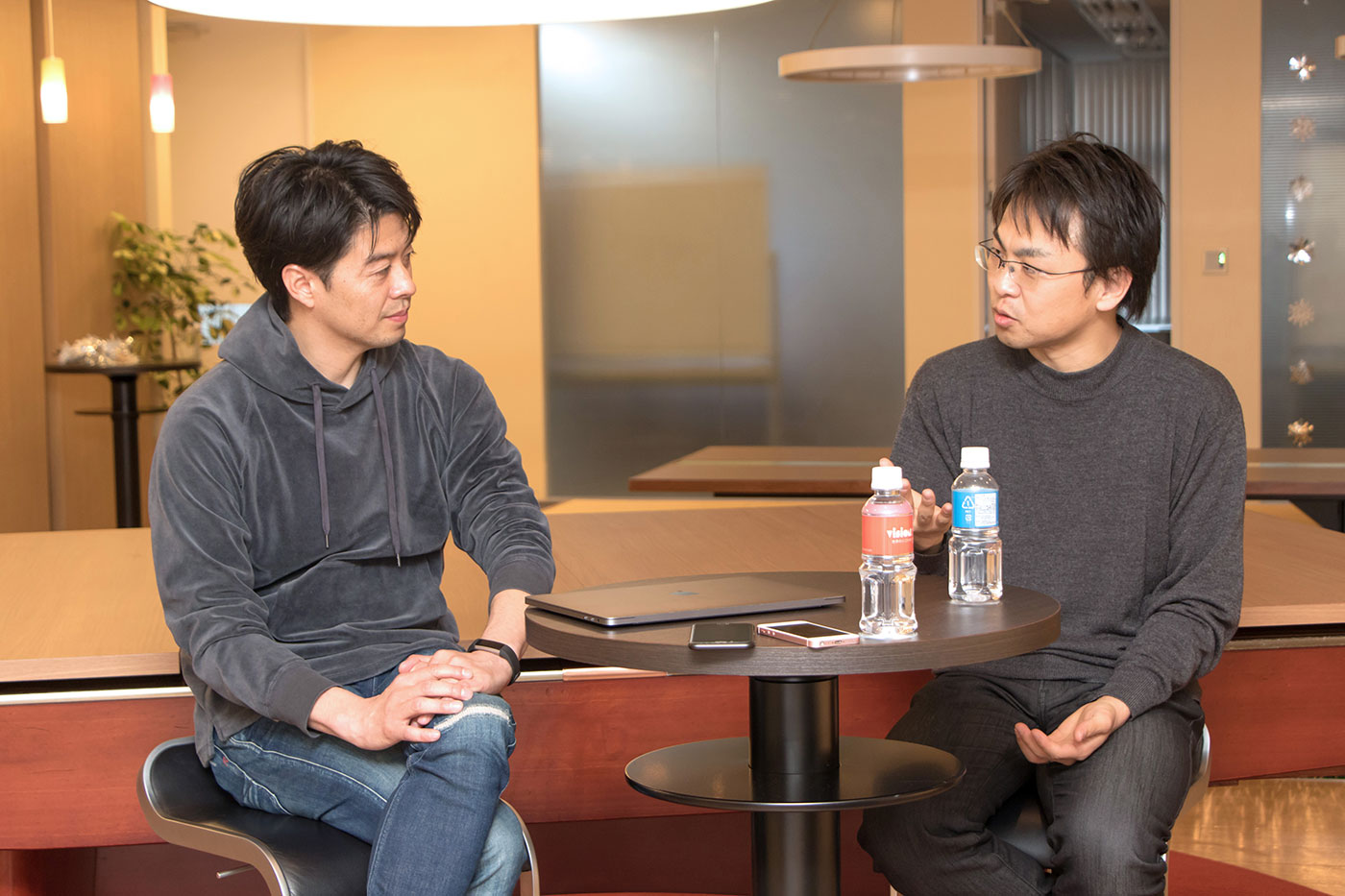
- Keiji
- Ok, let’s get started,
- Kuranuki
-
Yes.
How many employees are there at Colorkrew, approximately?
- Keiji
-
About 240 people.
Considering the scale of the company, the number of projects that we handle is quite big.
- Kuranuki
-
240!? That’s quite a lot!
I checked your website’s homepage, and it looks like you handle 4 projects.
So, you are saying that you are actually handling much more than that?
- Keiji
-
That’s right.
Everything is not published on our homepage, we are also entrusted with the development of web systems and smartphone applications, and we also handle some projects together with our clients.
Originally, we started as an Internet service provider (ISP) for home video game consoles, so we have strong connections with the video game industry.
- Kuranuki
- So you also develop some games?
- Keiji
- No, we have many clients from the game industry and we also do system development, but we don’t actually develop games as such.
- Kuranuki
- Ok, you don’t (smile).
- Keiji
-
During the early 2000, we were using the assets that we created when we were an Internet provider to make collocation our strongest service by lending things like racks or networks in data centers.
Starting around 2010, the clients’ servers’ environments shifted from on-premises to cloud, so we also started to get into it. -
We gave this project the nickname “Kuramane”. We are mainly designing, building and managing Azure and AWS, but the number of new customers in the game industry is shrinking. New customers are almost all from outside of the game industry.
Apart from that, there are billing authentication services, game management business etc.
In addition, recently we have been reinforcing our own services and products.
During Fall 2017, we released the paid version of our goal-oriented in-house SNS application “Goalous”.
We have also started another in-house product, “Mamoru”, a highly secure and user-friendly two-stage authentication service.
- Kuranuki
- A two-stage authentication service?
- Keiji
-
Yes. It is a 2-factor authentication system without password. With Mamoru PUSH, just input your ID in the login screen and this will send a push notification on your smartphone, so that you will just have to tap the notification to be able to login.
Then, after login like that, you have full access to several services through the single sign-on Mamoru SSO.
- Kuranuki
-
I see.
What is the percentage of engineers in your company, roughly?
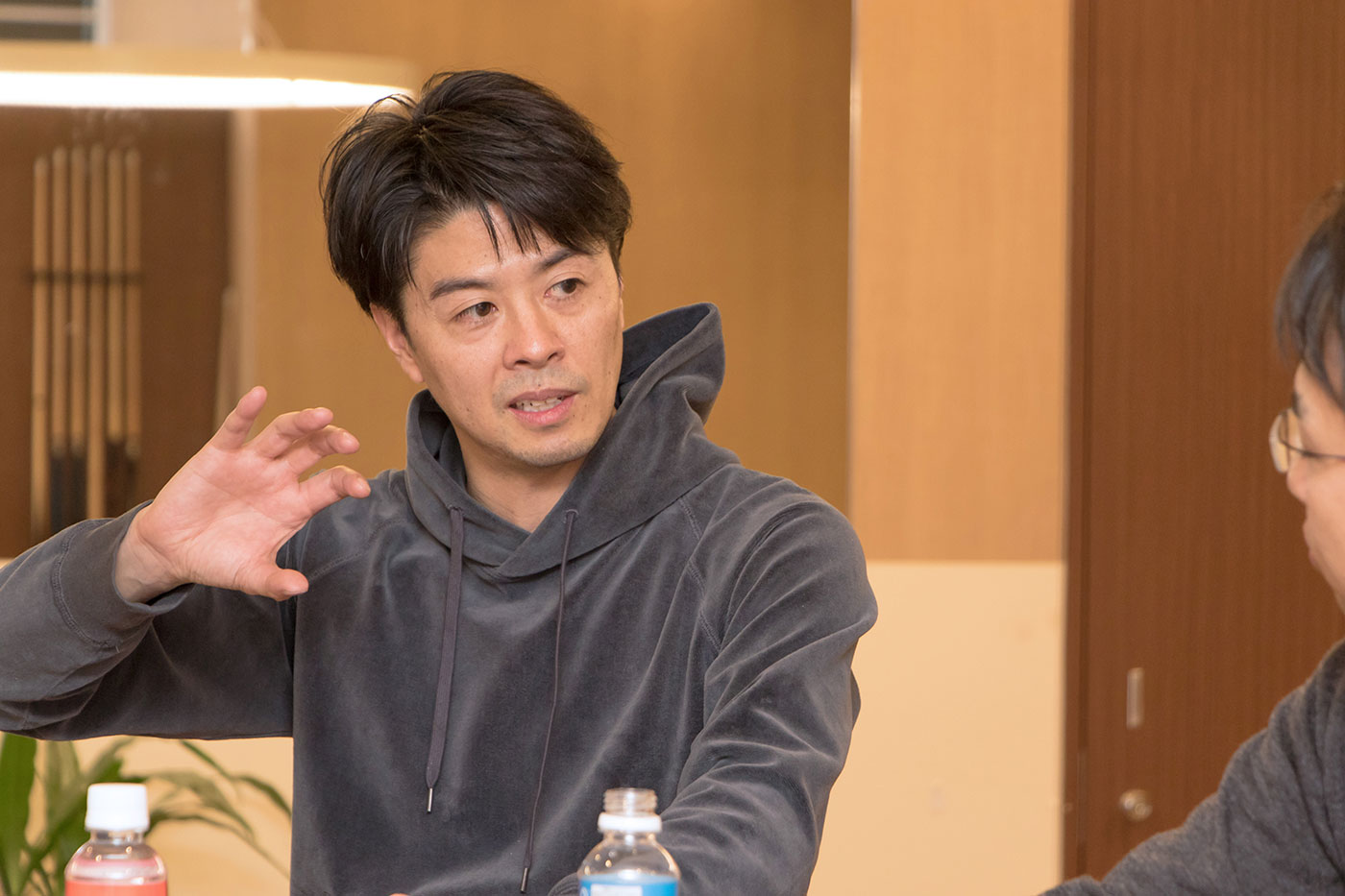
Employees in their fifties are the most active at Colorkrew!?
- Keiji
-
They represent a bit more than 30% of our full-time employees, which means nearly 40 people.
The other employees are in marketing, sales, development direction, corporate, game management etc... -
Colorkrew is an IT company but it doesn’t mean that it is a young company. The average age of our full-time employees is about 39 years old. There is also a significant number of our employees who are in their fifties.
There is no hierarchy in our unique very-flat company system, so they are all players.
There are no managers.
Even in their fifties, employees are very much working as players. We might actually be the Japanese company with the most active employees in their fifties. (smile) - For example, if there is any Internet inquiry about Goalous, usually I will go to do the business by myself.
- Kuranuki
- You go by yourself as a salesman!?
- Keiji
-
Of course! Because Colorkrew is Super Flat Model. (laughs)
At Colorkrew I’m not only leader in the administration, I also have a role as a salesman. -
Since there are no demarcation between the departments or the roles in the Super Flat Model, someone who is supposed to be working as a salesman is also likely to be involved in other tasks.
It is quite flexible.
- Kuranuki
-
So, you mean that even in the occupational categories, there is no clear demarcation?
Like, for example “I am a designer but I want to work also as an engineer”?
- Keiji
-
In theory, it is possible, even though currently we don’t have any case like that. (laughs)
At Colorkrew, we attach importance to the idea that each person becomes stronger by sharpening his own field of expertise. Every individual raises his value on the market.
Everyone tries to compete on the market with their own field of expertise as an asset while making sure that their working environment also allows them to easily face other kind of challenges.
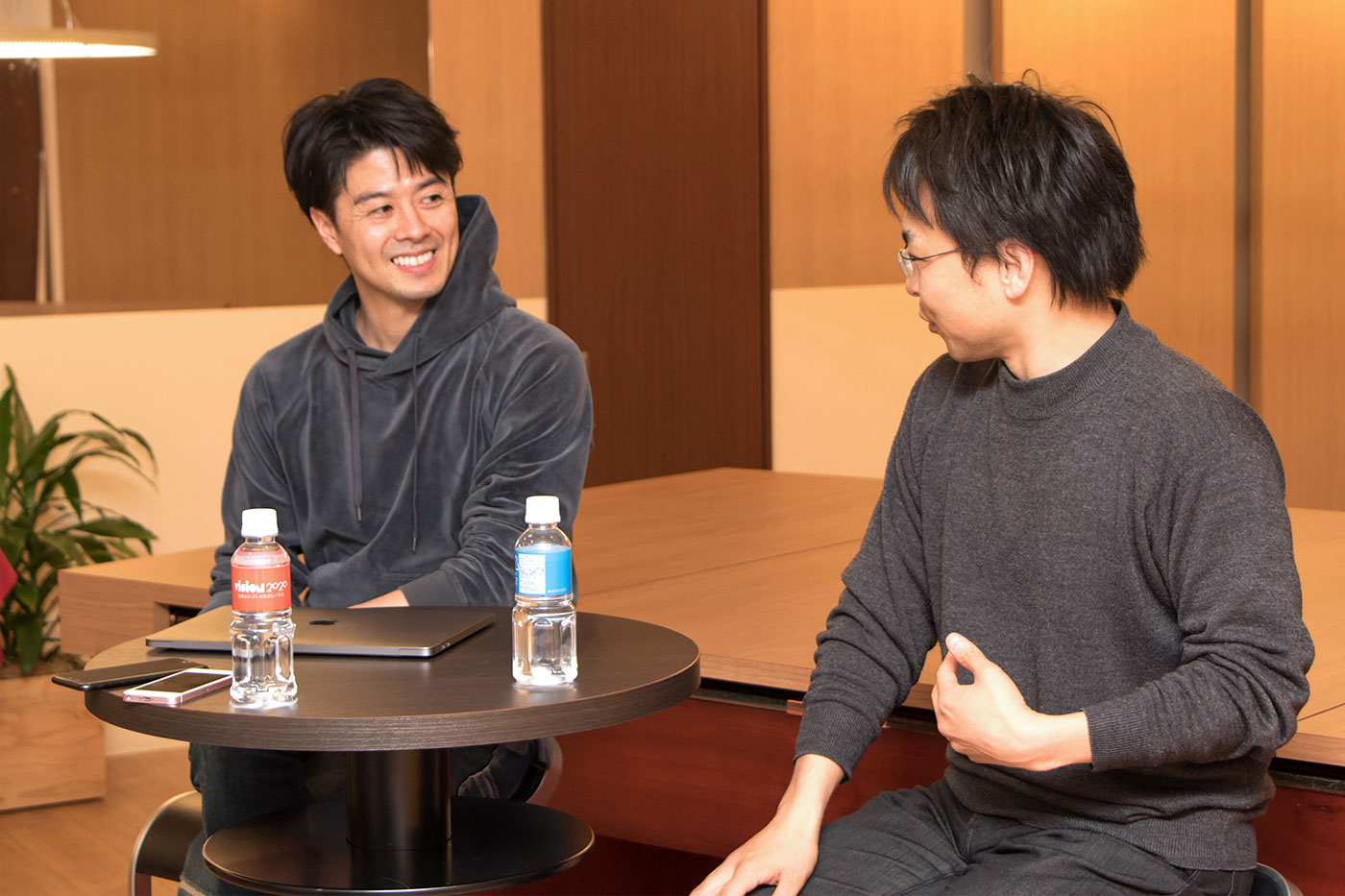
- Kuranuki
- Anyone can take up a challenge in another field if he wants to?
- Keiji
-
Yes.
It is not easy, though.
- Kuranuki
- Such environment that allows to try many different things in the same company without having to change job sounds great.
- Keiji
-
I think so too.
It is really hard to change company for taking on a new challenge, so giving opportunities to do it within the same company is a good thing, I think.
- Kuranuki
-
Sure it is.
By trying another occupation within the same company, people may find something which they are surprisingly well suited for.
- Keiji
-
Yes.
I didn’t expect you to be so interested in the Super Flat Model, so it makes me happy. Thank you very much.
Now please allow me to ask you a few questions too. - Sonic Garden is famous for the catchphrases “Entrusted development without delivery” and “control without management”. Some members of Colorkrew are reading the book that you wrote, Mr.Kuranuki, but can you explain what made you choose this kind of model?
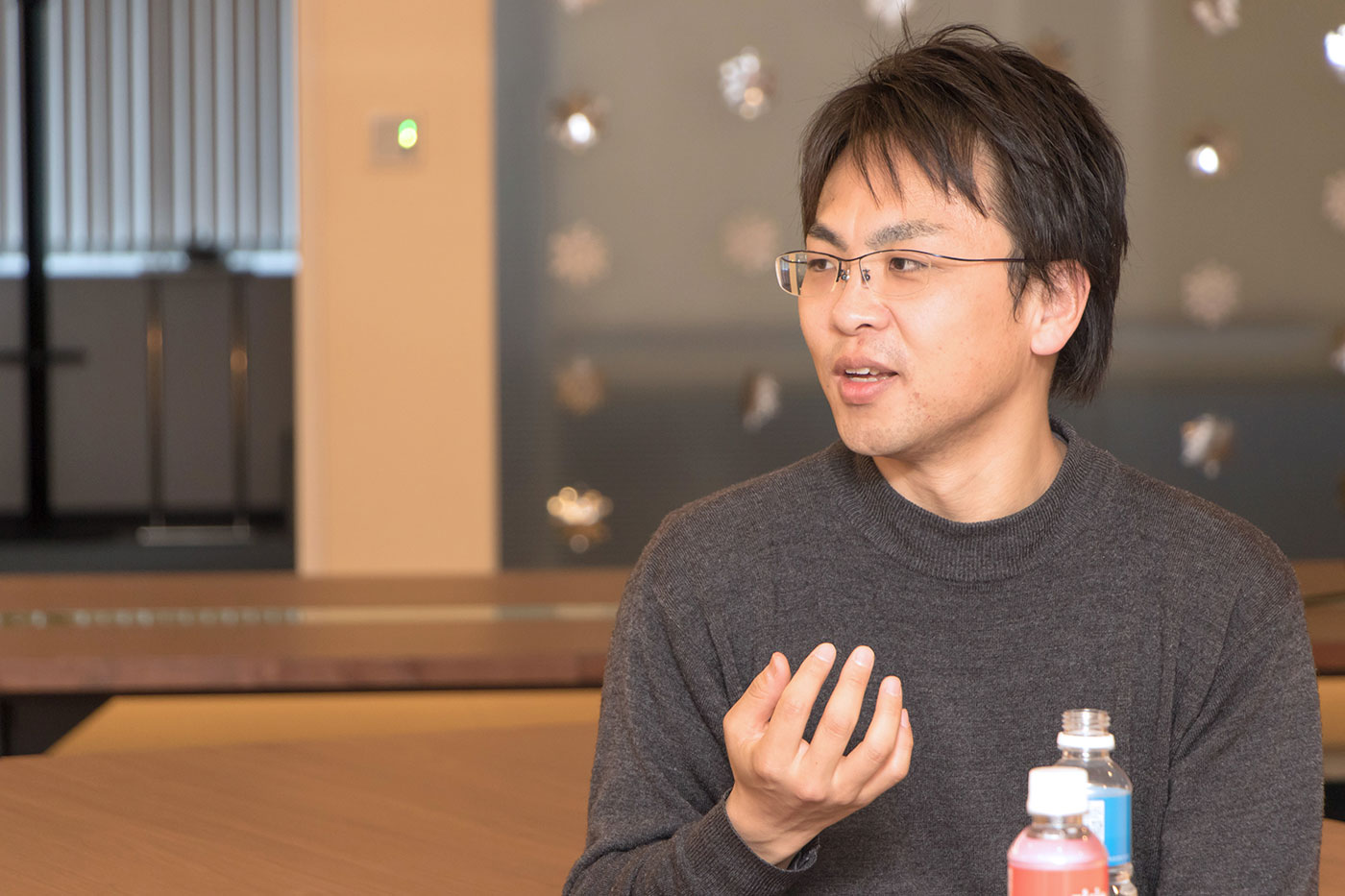
Entrusted development doesn’t make everyone happy
- Kuranuki
-
Originally, we used to be employees of the system integrator company TIS KK.
It began with an internal venture, and two years later I purchased it independently with MBO. So, I stayed a salaried worker at TIS all the time, without having to change job or to start my own business.
Since that time, I started to think that the existing entrusted development was not making anyone happy and that something needed to be done.
- Keiji
- What were the main factors that made people unhappy regarding entrusted development?
- Kuranuki
-
First of all, the “man-month” way of thinking.
Originally, I used to consider myself as a super programmer, and I felt offended to be given the same “man-month” treatment as the ordinary or mediocre programmers.
In the world of programmers, there is a huge difference of productivity depending on the people’s skills.
If there is people with low skills in the team, it can really affect the productivity. -
For example, if a team of 5 people wants to create a program.
Let’s suppose that in this team there are 4 skillful people and one unskilled people.
By calculating, it means that there is at least 4.3 man-month, right? However, the unskilled people is also followed, so actually it’s not even 4 man-month.
- Keiji
- I see. I think some people might feel hurt when they hear that (laughs)
- Kuranuki
-
With the “man-month” way of thinking, it is not good to get skillful people and unskilled people together.
In the “man-month” system, the higher the productivity is, the shorter it takes to make the job done, so the turnover is a little bit affected in businesses in which the contracts are lumped together.
Let’s suppose that unskilled people achieved something in 10 man-months, whereas skillful people achieved it in 3 man-months.
Looking from an outside perspective, it gives the impression that the skillful and high-productivity people are the one that don’t work hard.
That’s why it doesn’t make engineers happy. -
There are also some problems with the “delivery” way of thinking.
From the customer’s perspective, if some goods are delivered to them, after they get the delivery, if something needs to be fixed, they cannot get it fixed, so this is a problem.
From the maker’s perspective also, the maker gets money during the development stage, so it means that he makes some efforts until the product is ready, but stops his efforts when it’s finished.
Development in which the goal is only to deliver the product is not good for the company, not good for the customers and not good for the engineers.
Since I was selling products when I became independent as an internal venture, I used to think that it may be acceptable to earn my living only with product sales, but in that case marketers and sales would also be necessary.
After starting to expand the product and to sell it, when it is time to hire sales, a group of programmers cannot judge whether the applicant is good or bad. -
If it is a programmer, then if you meet, talk and ask him to write some code, you can understand his technical skills, but if it is a salesperson, they are all sweet talkers so you cannot really judge (laughs).
So I decided to make a company which can work well even without sales people.
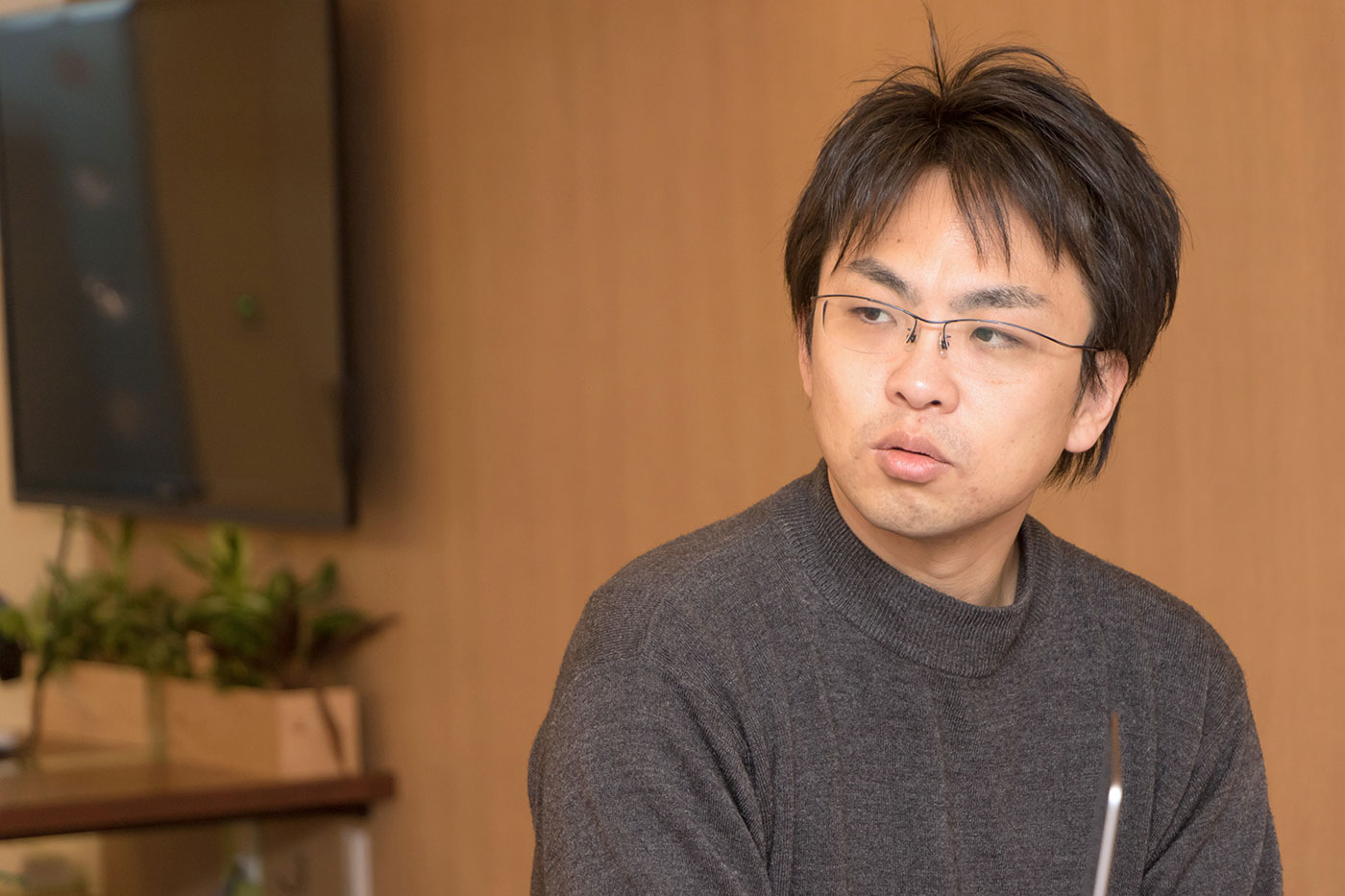
-
When I read "Visionary Company 2", a book on how to create a company's vision, I could read this: "Let’s decide where to go with the bus by looking at the passengers’ face". If you look at the face of five people who are independent together, everyone is a programmer.
"Well, let's make it a programmer's company, let's make a company that allows programmers to be happy and to do it as the job of their life". This is how Sonic Garden was born. -
The first thing to do as a programmers group is entrusted development.
But, I do not want to go back to the three hardships I mentioned earlier (man-month, delivery of products, and unhappiness of the engineers).
Everyone is in trouble because of the delivery of products.
I was thinking “Isn’t everyone happier when there are long-term relationships with the customers?” and “In which areas can we win independently as small company?” and that’s what lead me to the decision of getting rid of the delivery of goods.
What is entrusted development without delivery of goods?
- Kuranuki
- Unlike the traditional man-month way of thinking, “entrusted development without delivery” means that programmers become kind of individual consultants for each customer, like a legal advisor or a tax counselor.
-
When thoughts like “I want to start a new project” or “I want to improve my business” come up, having some excellent engineers among the employees can be really helpful.
However, most companies don’t have such people.
Especially in Japan, a lot of people that launch their start-up are not engineers.
Some of them may be good at marketing, but they don’t understand engineering. - What I said previously about not being able to hire sales people because of lack of understanding also applies for engineering, I mean people who are not familiar with it just don’t understand it.
-
I heard cases of people that got hired because they had great resume and hence were expected to have great skills but eventually happened to not even be able to write code. This is where we step in with a role like in-house engineers. This is “entrusted development without delivery”
Entering from the planning stage of the service and starting to working together from then.
- Keiji
- It is a role like a technical advisor, right? Or do you actually take part in the work itself?
- Kuranuki
-
We take part in the job plentifully. We become like CTO for start-ups or companies that don’t have their own CTO yet. We also undertake CIO’s tasks for small and medium enterprises that don’t have their own CIO.
Engineers talk with the customers, listen to their problems, and don’t only give them answers but also build some solutions. We believe that it is important to do both simultaneously. -
Direct conversation between the people that needs something and the people that can make it happen is the best way for programmers to make you happy.
It is not funny if someone else step in between and just makes what he is asked to make, it is better to make the other people enjoy directly what you have made, right?
This is the reason why in our opinion, being a programmer is not only about programming but also about consulting. -
The Sonic Garden programmers operate with a cloud after defining requirements, planning, designing if necessary, and programming.
If one person is able to do all of that, work can be completed only with that one person.
Such programmer would be the one that knows best about the customer as well as about the technology being used there, so he doesn’t need higher-ups anymore.
Increasing the productivity by raising the sense of responsibility instead of managing minutely, this is how I ended up making a company in which higher-ups are not needed. -
So we started from there to gradually reduce the management.
There is also no sales team and no human resources department, as well as no advertisement. If there is an inquiry to the company, I deal with it it by myself (laughs). -
The company in its current form is the result of this gradual elimination of the unnecessary positions.
We are also applying a “Super Flat Model” style with no departments and no management. There is also no middle management, there is only self-management.
- < PREV
- NEXT >
